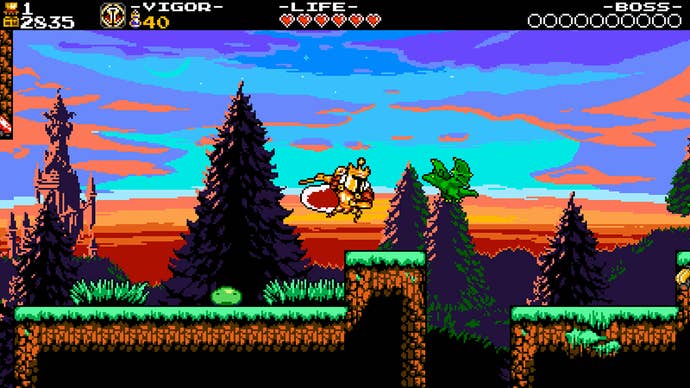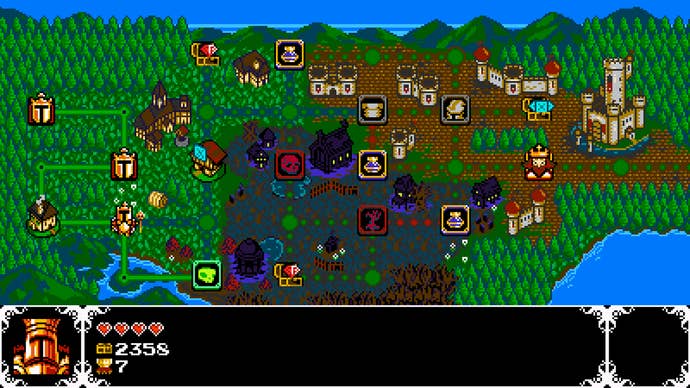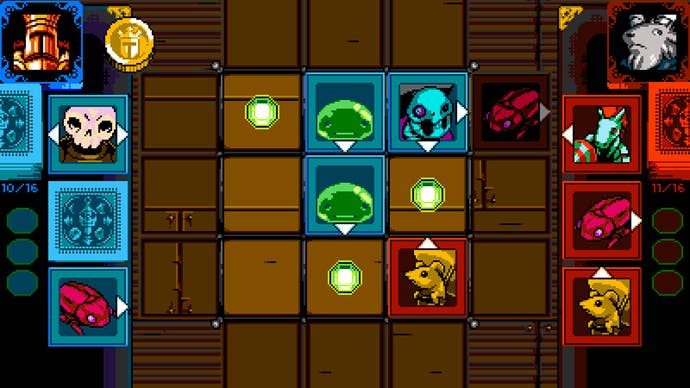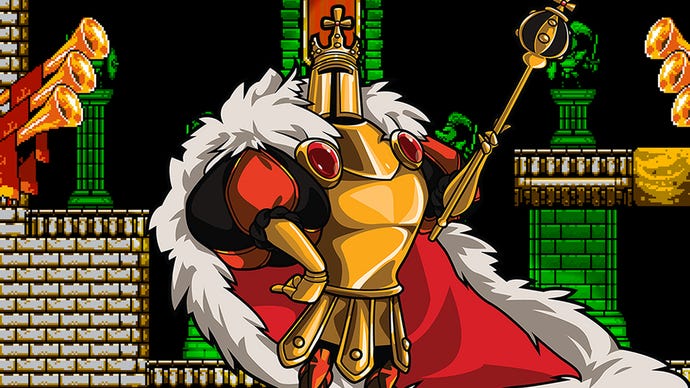Shovel Knight: King of Cards Review: This Crown Belongs to Another
King of Cards is the most ambitious Shovel Knight game to date, but it's not quite the best.
This article first appeared on USgamer, a partner publication of VG247. Some content, such as this article, has been migrated to VG247 for posterity after USgamer's closure - but it has not been edited or further vetted by the VG247 team.
In a classic Simpsons episode. Marge finds a brilliant pink Chanel suit on discount that earns her access to a country club. After being cruelly teased for wearing the skirt suit too many times, she laboriously alters it, but no one is fooled—it's still the same outfit.
As Shovel Knight games go, King of Cards isn't so different from Marge's skirt suit. It heavily alters the level structure; adds a new card game, and introduces a multitude of other changes. But underneath it all, it's still the game we've been playing for five years now. There isn't much that can be done to make the old material seem new, even for a highly talented studio like Yacht Club Games, and even some of the new elements wind up falling a little bit short.
Following on from the three previous entries—each of which starred a different character—King of Cards shifts the spotlight to King Knight, the first boss of the original game. Unlike Shovel Knight and company, King Knight's goal is not to defeat the Order of No Quarter, which is good because this has been the goal for several games now. Instead, he's out to defeat three major kings, each of which rules a separate world map.
King Knight's adventure has a light touch, even by Shovel Knight standards. He travels around on an airship with his mother, who dotes on him and makes him pies, as well as his ever-growing court. King Knight himself could charitably be called a moron and a psychopath—an empty-headed narcissist who only seems to want power, but somehow inspires loyalty wherever he goes.
I'll go on record as saying that King Knight is probably my least favorite of the major Shovel Knight protagonists. He has none of the silent dignity of Shovel Knight; the pathos of Specter Knight, or the raw chaotic fun of Plague Knight. Instead, he's a spoiled child. Yacht Club does well with the material it has—it was the fans who chose King Knight in the first place, after all—but it's tough when your hero is an unsympathetic brat, even if it's played for laughs.
I'm similarly mixed on his main conceit, which involves dashing into enemies and launching into a delicate pirouette, then landing on them to do damage. It's intuitive, but a little bit contrived, and by its nature difficult to control. It works within the context of the level design, but it feels like a gimmick more often than not—not the best foundation for a highly technical platformer.

Granted, pure platforming has never been a big strength of the series. Intricate level design has long masked slippery landings and characters who handle like bricks. King of Cards is no exception in that regard.
So what does King of Cards get right? Quite a bit, actually. Liberated from the "kill the eight bosses" format of previous games, Yacht Club is free to play around with much shorter level formats. It may be overselling it a tad, but you could say it unites the best of Mario 3 and Mario World with short, snappy levels featuring lots of secrets and alternate routes.
This approach makes it easy to miss a surprising amount of King of Cards, which is obviously excellent for replayability. To wit, one map is designed in such a way that you can basically avoid the entire bottom half if you want. Members of the Order of No Quarter roam freely, serving as optional bosses who will earn you a ton of money if you successfully defeat them.

That partly ties into another major component of King of Cards: the card game, Joustus. Anyone who played Final Fantasy 8 will remember its famous Triple Triad card game, where you would travel around defeating opponents and taking cards, and Joustus borrows heavily from it. You can challenge friends and enemies of all stripes throughout the world of King of Cards, including members of the Order of No Quarter, earning cards to build up your deck.
I'm a Triple Triad veteran, so I was pumped to play Joustus, but to my disappointment it never quite took. The rules are simple enough to understand—use the arrows on each card to push other cards on to gem spaces—and games move very quickly. Proper card placement requires a decent amount of tactical thinking, which I like, and I enjoy collecting cards. Maybe it's because the cards themselves don't have stats? Or maybe it's because I never quite grasped the main strategy. Either way, you can pretty much ignore Joustus if you want, which is ultimately what I did.
It's too bad because Joustus is one of the key differentiators of King of Cards. When I ultimately wrapped the rather brisk campaign, I was surprised to find myself with a distinct "been there, done that" feeling. Yes, it's an origin story; and yes, it introduces lots of new elements, but I know the level concepts, characters, and story beats intimately at this point. This is basically the fourth time I've finished Shovel Knight, and as much as I love it, it just can't hit as hard as it once did. It doesn't help that King Knight himself is despicable, resulting in his particular arc landing rather differently than other adventures in the series.

Still, Marge really did a hell of a job altering that Chanel suit, and the same can be said of Yacht Club's work on King of Cards. The production values are beyond reproach; the level design is characteristically excellent, and many of the new elements—particularly the expanded world maps—go a long way toward refreshing the experience. Taken on its own merit, it's very good, even if it doesn't rise to the level of the other episodes.
It fits in well as a companion piece on the already expansive Treasure Trove Collection; an episode that should be tackled if you desperately need more after wrapping the original Shovel Knight and Specter of Torment (I'm personally a fan of Plague of Shadows too, but I know I'm in the minority). But as a stand-alone release, I've seen better from Shovel Knight. Might I recommend the outstanding Shovel Knight Showdown instead?
ConclusionShovel Knight: King of Cards revisits the formula one last time with new maps and bosses, as well as a brand new card game. It's ambitious, but it's also the least essential of the major Shovel Knight episodes. If you own Treasure Trove, play Shovel of Hope and Specter of Torment first, then circle back to King of Cards if you still want more.


